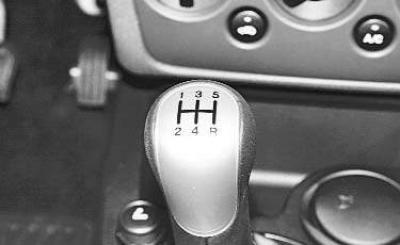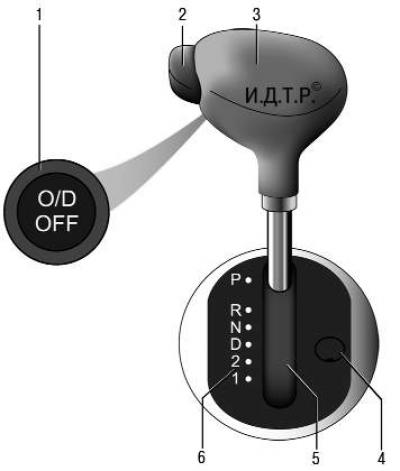
Manual transmission operate according to the switching diagram printed on the handle of its lever. In the neutral position, the lever is automatically set in the direction of engagement of the 3rd or 4th gear, from which it can be moved forward or backward respectively. To engage 1st or 2nd gear, move the lever to the left as far as it will go and then move forward or backward accordingly. To engage V gear, move the lever to the right as far as it will go and forward.
To engage reverse gear, move the lever all the way to the right and then back.
Attention! Engage reverse gear only when the vehicle is completely stopped.
Robotic gearbox Durashift EST (pic. 1.11) is an advanced five-speed manual transmission with an automatic mode that allows you to shift gears without using the clutch pedal. Compared to an automatic transmission, the Durashift EST transmission delivers more dynamic acceleration and significant fuel savings in traffic jams.

Pic. 1.11. Durashift EST Robotic Transmission Selector Lever
The robotic gearbox control selector lever is marked with the following symbols:
- «N» – neutral. The engine can only be started if the selector lever is in position «N»;
- «D» - moving forward. Depress the brake pedal and move the lever from the position «N» into position «D». In this position, the transmission switches to automatic mode. After releasing the brake pedal, the car starts to move at a low speed. To start moving, press the accelerator pedal.
When using the position «+» or «–» in automatic mode, manual shift mode will be selected and the currently selected gear will appear on the LCD;
- «R» - reverse. Move the lever to this position only after the vehicle has come to a complete stop.
Automatic transmission It has four forward gears and one reverse gear. The inclusion of each gear occurs automatically depending on the position of the gear selector lever, vehicle speed and the position of the accelerator pedal.
Note. During the break-in period of a new vehicle or immediately after connecting the battery (after disconnection or replacement) gear shifting may not be as smooth as usual. This does not indicate a malfunction: after several automatic gear shifts, the shifting process will become smooth.
In addition to the automatic control mode, there is also a manual mode in which the driver can independently quickly shift gears by moving the selector lever forward or backward.
Note. Unlike a manual transmission, an automatic transmission, while in manual control mode, allows the driver to shift gears without releasing the accelerator pedal.

Pic. 1.12. Automatic transmission selector lever: 1 - button for turning on the OVERDRIVE mode; 2 - button for locking the gear; 3 – lever handle; 4 - plug; 5 – slot of automatic control mode; 6 - automatic control mode scale
The selector lever is located on the floor tunnel in the same place as the manual transmission control lever. On the lining of the floor tunnel there are scales of manual and automatic control modes. On handle 3 (pic. 1.12) lever there is button 2 for locking the gear.
On the scale 6 of the automatic control mode, the following designations are applied:
- «P» – parking. In this position, the transmission is locked to prevent the parked vehicle from moving. If the selector lever is in this position, the engine can be started;
- «R» - reverse. Move the lever to this position only after the vehicle has come to a complete stop;
Attention! Never move the selector lever to the «P» (parking) or «R» (reverse) while driving! This will damage the gearbox.
- «N» – neutral. In this position of the lever in the gearbox, no gear is engaged. This position is used during long stops, such as traffic jams;
Attention! Never move the selector lever to the «N» (neutral) while driving! In this case, you can accidentally move the lever to the position «P» (parking) or «R» (reverse), which will damage the transmission. In addition, engine braking will become impossible.
Note. To maintain control of the vehicle, always keep your foot on the brake pedal when the lever is in the «N» (neutral), as well as when moving the lever to this position.
Note. If the car is on a slope, then when starting the engine, the selector lever must be set to the position «P» (parking), but not «N» (neutral).
- «D» - moving forward. This is the main position of the selector lever, in which it is located most of the time when driving. In this case, the automatic transmission selects the gear that is optimal for a given speed and acceleration of the car. When driving down a steep descent, a downshift may automatically be engaged to provide more effective engine braking.
To move the selector lever from position «P» (parking) into position «R» (reverse) press the lock button 2 while depressing the brake pedal.
Note. A special locking device will not allow you to move the selector lever from the position «P» (parking) to any other position if the brake pedal is not held down.
To further move the lever to the positions «N» (neutral) And «D» (forward movement) You don't need to press the lock button. To move the lever back from position «D» (forward movement) into position «N» (neutral) the lock button does not need to be pressed, and to further move the lever to the positions «R» (reverse) And «P» (parking) button should be pressed.
Attention! Do not press the lock button each time the selector lever is moved from one position to another. This will become a habit and you can move the lever to the «P» (parking) or «R» (reverse) while the vehicle is moving, which will damage the transmission.
Attention! When starting a movement, do not press the accelerator pedal when moving the selector lever from the position «P» (parking) or «N» (neutral) to some other position. This is dangerous as the vehicle may move suddenly forward or backward.
When the ignition is on, the display of the instrument cluster shows the designation of the position of the selector (automatic switching mode) or the number of the included gear (manual switching mode).
Whether the vehicle is moving or stationary, to select manual shift mode, move the selector lever from the «D» (forward movement) into the manual shift slot. In manual transmission control mode, you can quickly change gears by moving the selector lever forward or backward without releasing the accelerator pedal.
To shift to a higher gear, move the selector lever forward in the direction of the sign «+» and release the lever. To change to a lower gear, move the lever back towards the sign «–» and let go.
Attention! In manual transmission control mode, shifting to a higher gear does not occur automatically. It is up to the driver to determine when to shift into a higher gear according to road conditions. In this case, it is necessary to ensure that the engine speed does not exceed the maximum allowable value (the tachometer needle did not enter the red zone of the scale).
Attention! Quick double shift of the selector lever back in the direction of the sign «–» allows you to skip one gear when downshifting. For example, switch from III gear to I or from IV gear to II. Since in this case, sudden engine braking can lead to a loss of traction of the wheels with the road surface, shifting to lower gears should be done carefully, taking into account the speed of the car.
Note. In manual transmission mode, only one of the four forward gears can be selected. To drive in reverse or park, move the selector lever to slot 5 (see fig. 1.12) automatic mode and then to position «R» (reverse) or «P» (parking) respectively.
Note. To ensure the necessary traction and dynamic characteristics and vehicle safety, the automatic transmission may not shift to a higher gear at insufficient vehicle speed, even if the driver moves the selector lever forward in the direction of the sign «+». Similarly, the transmission may not downshift at high speeds even if the driver moves the selector lever back in the direction of the «–», to prevent excessive engine speed increase.
Note. In manual transmission control mode, when the vehicle speed decreases, downshifting occurs automatically. When the car stops, 1st gear is automatically engaged.
Note. To facilitate starting on slippery surfaces, move the selector lever forward in the direction of the sign «+». At the same time, the second gear will immediately turn on in the box, which will ensure smooth starting on a slippery road. Then, to re-engage 1st gear, move the selector lever back in the direction of the sign «–».
Note. Move the selector lever into the manual mode slots and when changing from manual to automatic mode smoothly, without undue effort. Sharp and strong movements can damage the lever.
In the event of a discharge of the battery or a malfunction of the electrical equipment to unlock the automatic transmission (moving the selector lever from position «R») perform the following operations.
1. Pry with a screwdriver and remove the plug 4 (see fig. 1.12) next to the selector lever.
2. Press the lock lever located under the plug and move the selector lever from the position «R».
3. Replace the plug.
OVERDRIVE mode. The OVERDRIVE off button is located on the handle of the automatic transmission selector lever and allows the driver to avoid shifting the automatic transmission to IV gear, which allows the car to become more dynamic while driving at high speed or in situations where frequent gear shifting from III to IV is necessary. In addition, the automatic transmission selector lever can be set to the position «1» or «2» to ensure safe driving on slopes and snowy roads.
Visitor comments